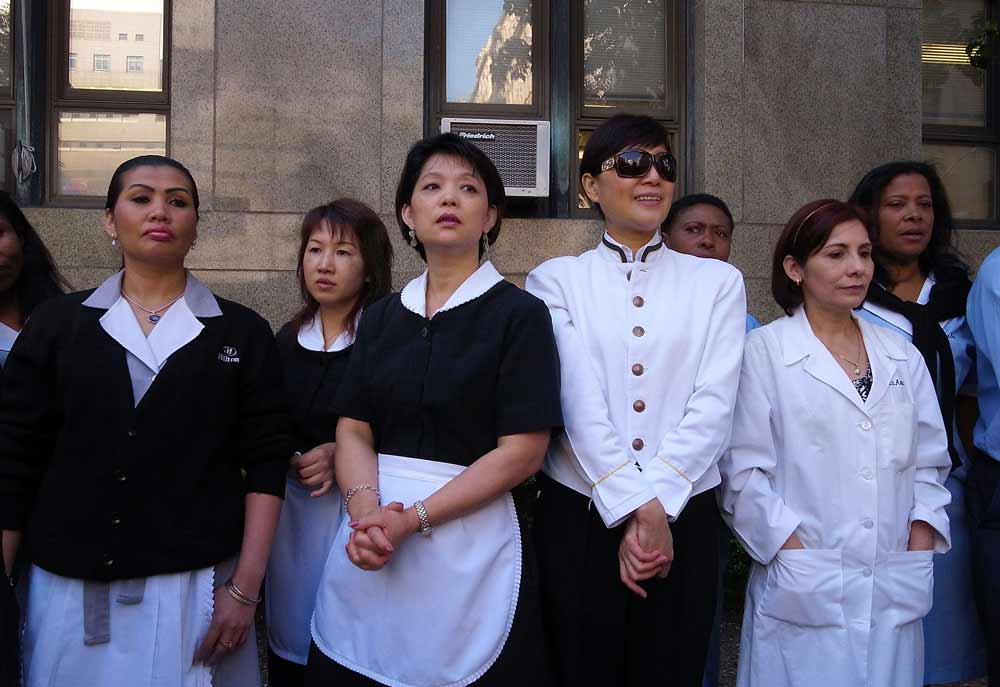 Local New York City hotel housekeepers waiting for the arrival of Dominique Strauss-Kahn to enter Manhattan Supreme Court in June 2011.
Local New York City hotel housekeepers waiting for the arrival of Dominique Strauss-Kahn to enter Manhattan Supreme Court in June 2011.
Hotel housekeepers in the Middle East say that panic buttons could be more of a nuisance then a necessity if a US initiative to equip housekeeping staff with the personal security devices was to be rolled out in this region.
Operators of New York City’s largest hotels agreed last month to equip all housekeeping staff with personal panic buttons, leaving hoteliers in other cities worldwide wondering whether they could be next in line for the initiative.
The security devices are intended to help staff summon help if they encounter danger in a guestroom, a possibility brought to light when a hotel maid claimed she was sexually assaulted by former IMF chief Dominique Strauss-Kahn in his suite at the Sofitel New York last year.

| Advertisement |
Housekeeping bosses in the Middle East told us assaults are rare, but they do happen.
“There was one incident where a guest was drunk and trying to close the door while the housekeeping girl was inside, she called for help. It’s not only the girls, sometimes the boys have a problem,” Ramanathan Sivalingam, director of housekeeping, Towers Rotana Dubai told Hotelier Middle East.
Laetitia Lasry, executive housekeeper at The Palace, The Old Town – Dubai, has dealt with two cases of reported sexual harassment against staff in recent years.
“The last time it happened, the girl came to see me afterwards. The guest had asked her to go into his room to help with the luggage, and while she was going in he touched her backside and he was obviously hoping something would happen,” recalled Lasry.
“She told him ‘you have no right to do this to me… there are cameras on the corridor and someone will know I’m here’. After investigations we saw the guest [on CCTV footage] going out checking for cameras before he let her go.”
The concerned male had already checked out of the hotel by the time hotel staff were ready to confront him.
On another occasion, said Lasry, an older man – “with a bit of a grandpa attitude” – told a chamber maid how “cute” she was before grabbing her face and pulling her in for a kiss. As the alarmed housekeeper made for her exit, the man asked her to return to his room for a “party” with some friends, telling her she could bring friends along too.
The girl reported the incident and the ‘grandpa’ appeared to back-off after a few stern words from the team outlining the inappropriateness of the gesture and clarifying that there would be no party.
“But if a guest really gets out of order, we will ask them to go,” asserted Lasry.
Since these two incidents, Lasry has put procedures in place to ensure that housekeepers do not work alone, but in pairs – which also saves on equipment and halves the time spent in each guest room, she says.
While pairing up may work as a precaution for room-cleaning staff, most hotels simply do not have the resources to make every room-service and mini-bar attendant have a colleague tagalong. In New York hotels, the personal alarms will be distributed — within a year — to any staff member required to enter a guest room, but the unknown cost of implementing this precaution is one of several hotelier concerns.
Article continues on next page...








 Search our database of more than 2,700 industry companies
Search our database of more than 2,700 industry companies










Feb 22, 2012 , Germany
Dear author, help me understand why these panic buttons could be a nuisance. It;s the headline but I can see any context. i would be interested to know what the concerns are.